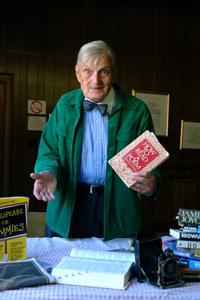

At age 87, Sean O'Sullivan has a zest for life and learning. (Photo by Hank Daniel)
Use it or lose it. Your brain is like a muscle. Exercise it and it develops. Don't, and your brain functions will degrade even if you lead a normal, healthy life.
* * * *
Do not go gentle into that good night.
Old Age should burn and rage at close of day.
- from "Do Not Go Gentle Into That Good Night" by Dylan Thomas
* * * *
According to "Brain Gain: Mental Exercise Makes Elderly Minds More Fit" (December 2006, ScientificAmerican.com), a new, long-term study proves that mental training helps older adults retain their mental fitness. More than 2,800 seniors, average age 74, participated in the study to see if anything can be done to reverse age-related mind decline. the good news: there is. The research holds out hope that simple mental exercise may play a key role in staving off dementia and other cognitive declines that currently afflict at least 24 million people worldwide. But it is not as simple as continuing to do crossword or sudoku puzzles. The brain must be continually stretched and challenged.
In The Mature Mind (2005), Gene Cohen, founding chief of the Center on Aging at the National Institute of Mental Health, says:
"To learn, we must remember....[The] process of memory formation is summarized by the phrase 'neurons that fire together, wire together.' Not only does learning link neurons in new patterns, it also stimulates neurons to grow new connections.... The idea that the brain physically changes as a result of learning - a phenomenon called plasticity - emerged in the mid-1960s from animal studies....[Researchers found that] the brains of older rats showed the same kind of robust response to a stimulating environment as the brains of younger rats...."
Cohen adds, "The types of leisure activities you pursue affect your brain fitness. A study of the connection between leisure activities and the risk of dementia and cognitive decline found the following to be the most effective activities (listed in order of the impact they have):
"The reduction in risk was related to the frequency of engagement. For example, among older people who did crossword puzzles four days a week, the risk of dementia was 47 percent lower than among those who did them only once a week." Cohen continues, "The brain is in some ways like the foundation of a building. It provides the
physical substrate of the mind, the personality, and one's sense of self. Our brain 'hardware' is capable of adapting, growing, and becoming more complex and integrated with age. But at the same time, our minds also grow and evolve. This is psychological development - development of insight, emotional stability, knowledge, creativity, and expressive abilities."
In a review of The Mature Mind, Publishers Weekly wrote, "Old dogs can learn new tricks, says psychiatrist Cohen.... Drawing on the results of two groundbreaking studies, Cohen illustrates that the years after age 65 are anything but 'retiring,'and that creativity, intellectual growth and more satisfying relationships can blossom at any age."
To that end, local educational institutions offer programs where seniors, age 50 and older, for nominal fees, can audit college courses and participate in classes geared especially toward their mature interests.
* * * *
A! Magazine for the Arts recently chatted with several people who participate in arts-related programs at colleges for older adults - seniors who share a love of learning and want to broaden their lives.
-- ALMA RIGBY, 73, can usually be found taking one of Virginia Intermont's classes for seniors: "I love to do things with young people."
-- JOAN HORSCH, 76, has participated in the Arts Array Film Discussions for 10 years: "The film discussions are really interesting because someone else always sees something you didn't see or has an extremely different impression of what the ending means."
-- REBECCA HARRINGTON, 64, has been swept away in The Barter Experience: "I almost didn't go see Dracula, thinking 'how many times do I need to see that production?' But I went to the theaterand I'm so glad I did."
-- CAROL BELL, 67, joins in discussions at SVHEC about Women Writers: "Some people mention other books. Everyone goes away with new things to read and a new focus on the Appalachian region and the writers."
--ANNE ARMENTROUT, 60, loves words so Improvisation & Creative Movement is right up her alley: "The class provides exercises not only for the body, but also for the mind and imagination."
-- SEAN O'SULLIVAN, 87, views the College for Older Adults as "a jewel in the mountains." He says, "It's like a social mixer, also. I've met people there that I would not have met otherwise."
-- PROGRAMS for older adults are available in the region.
-- HISTORIC EXAMPLES: The Arts & the Brains of Older Adults